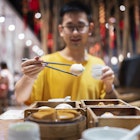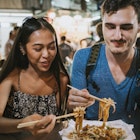
Bangkok's 12 best dishes: a bite-sized guide to Thai cuisine in the capital

Dec 29, 2021 тЂ 5 min read

From pad thai and mee grorp to mataba and or sooan, these are the meals every visitor to Bangkok should try ТЉ Brostock / Getty Images
For a relatively small country, 's cuisine is astoundingly diverse, with dishes changing in form and flavour just about every time they cross a provincial border. , by far Thailandтs largest city and a melting pot of people and food, is no exception to this diversity, and the city can lay claim to its own distinct cuisine.
The people of Bangkok are particularly fond of sweet flavors, and many dishes include freshwater fish, pork, coconut milk and palm sugar т common ingredients in the central Thai plains that surround the city. Easy access to the sea also means an abundance of seafood.
Immigrants from southern China have been influencing Thai cuisine for centuries, and it was most likely Chinese laborers and vendors who introduced the wok and several varieties of noodle dishes to Bangkok and the rest of Thailand. Likewise, Muslims are thought to have first visited Thailand during the late 14th century, bringing along with them a meat- and dried-spice-based cuisine that eventually made its way to Bangkok.
Another significant influence on the Bangkokтs kitchens stems from the royal court, which has been producing sophisticated and refined takes on central Thai dishes for nearly 300 years. And in more recent years, immigrants from Thailandтs rural corners have brought their dishes to the city, with some of them emerging as local staples.
Read on to learn about 12 of the most iconic Bangkok-style dishes, and where to try them.

Pat tai (pУ t tai) is a staple dish in Bangkok
Thailandтs most famous dish т a Bangkok street eat staple т takes the form of rice noodles stir-fried with dried and/or fresh shrimp, bean sprouts, tofu, egg, and seasonings, and is traditionally served with lime halves and a few stalks of Chinese chives and a sliced banana flower. Decades-old and perpetually packed Thip Samai is undoubtedly Bangkokтs most lauded destination for the dish.

Tom yam (ФУДm yam) is a delicious spicy soup
Lemongrass, makrut lime leaf and lime juice give tom yam т often insufficiently translated as "Thai sour soup" т its characteristic aroma and tang; fresh chillies or an oily chilli paste provide it with its legendary sting. Tom yam is available just about everywhere in Bangkok, but itтs hard to beat the version at Krua Apsorn, a well-known shophouse restaurant in the cityтs old district.

Gooay teeo reua (gХoТЗay ФФeТЗo reuТЗa) is a slow-cooked broth
GХoТЗay ФФeТЗo reuТЗa translates as "boat noodles", so-called because the small bowls were previously served from boats along the canals and rivers of Bangkok and central Thailand. Based around a dark, slow-cooked broth that unites meat, herbs, dried spices and sometimes blood, these pork- or beef-based bowls are among the most full-flavored т and perhaps intimidating т of all Thai noodle dishes. Try a bowl at land-bound Bharani.

Som tum (ВѕУДГОТЗЕЈВЙГО) originated in northeast Thailand
This dish т of thin, crunchy strips of papaya bruised with a mortar and pestle along with tomatoes, long beans, chillies, garlic, fish sauce, and lime т has its origins in Thailandтs rural northeast. When migrant laborers brought it to Bangkok, it became popular among city dwellers, who love the spicy hit it provides. Feel the burn for yourself at ramshackle streetside restaurant, Jay So.

Kanom beuang (kУ ТЗnХm bУЊuТЗang) is a sweet or savory snack
The old-school version of this tiny, taco-like snack is sold with two types of fillings: sweet, which combine rich strands of duck egg and preserved fruit, and savory, which include a spicy mixture of dried shrimp and pepper. It is served by street vendors in older parts of Bangkok, such as the stall at Nang Loeng Market.

Mee grorp (mУЈe grУВrp) are traditional crispy noodles
Crispy noodles prepared the traditional way, via a former palace recipe that provides the dish with a uniquely fragrant, sweet/sour flavor, are a dying breed. Poj Spa Kar, allegedly Bangkokтs oldest restaurant, continues to serve the dish.

The best bamee (ВњУ ТЗГОУЈБ№) is served in Bangkok's Chinatown
Although these Chinese-style wheat and egg noodles, typically served with slices of roast pork, a handful of greens and/or wontons, are ubiquitous in Bangkok, not every bowl is created equal. For something exceptional, head to Bangkokтs Chinatown, where numerous restaurants and streetside stalls sell the dish.

Gooay teeo kooa gai (gХoТЗay ФФeТЗo kУДoТЗa gУ i) is a delicious Bangkok noodle dish
Wide rice noodles fried with little more than egg, chicken, preserved squid, and garlic oil is a dish rarely seen outside of Bangkok, and one thatтs at its delicious peak as sold from street stalls and restaurants in Bangkokтs Chinatown.

Or sooan (or sУВoТЗan) is a sticky oyster dish
Another Bangkok Chinatown staple, this dish combines a sticky, eggy batter topped with just-cooked oysters. Shophouse-based restaurant Nai Mong Hoi Thod does what is arguably Bangkokтs best take on this dish.

Head to the old quarter for the best kow mok (kУДw mУВk)
Biryani or spiced rice, a dish found across the Muslim world, also has a foothold in Thailand. In Bangkok the dish is typically made with chicken and is served with a sweet-and-sour dipping sauce and a bowl of chicken broth. Find it in Bangkok's old quarter at Karim Roti-Mataba.

Sate (ВѕУ ТЗЕЈУЉ) can be found in Chinatown
Grilled skewers of meat, a staple in Southeast Asiaтs Muslim countries, probably came to Thailand via or . Today, the slightly sweet peanut-based dipping sauce that accompanies them is often mistakenly associated with Thai cooking outside of Thailand. Sate is available streetside in Bangkok's Chinatown.

Choose from sweet or savory mataba (ГОУЁТЗГйУ ТЗВњУ )
Known as murtabak in Malaysia and Indonesia, these are thin sheets of dough that have been stuffed with a savory (minced chicken or beef with egg and seasoned with curry powder) or sweet (egg and slices of banana) filling and fried until crispy. Try this at classic Bangkok-style shophouse restaurant, Karim Roti-Mataba.
Explore related stories







 Food10 of the worldтs best foodie destinations (and what to eat when you get there)
Food10 of the worldтs best foodie destinations (and what to eat when you get there)Mar 1, 2024 тЂ 12 min read


